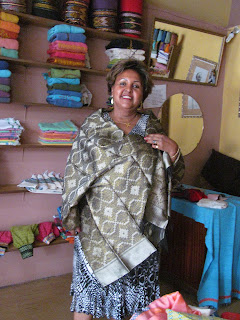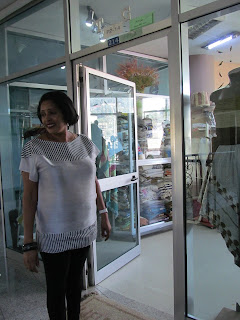How
appropriated to spend Good Friday morning (April 14, 2017) as Jesus would have
done, visiting sick children at the Zewdutu Hospital in Addis, Ethiopia. We chose the Pediatric Ward. Blessing, one of the participants from EWEA
arranged the visit. She is a trained
Social Worker and works as a Pastor.
Three nurses met us to take us on the tour.
 |
| Blessing (left), her brother Daniel, Lydia talking with the three nurses who came in on their day off to take us on the tour. |
We go to ‘Neuro’ first. It is sad to see such serious birth defects and to know that if the mothers when pregnant had had folic acid supplement, these hydrocephalic and spinal bifita babies would probably have been born normal. Shunts are very expensive. Government and other organizations donate the surgery. Sometimes it is too late for surgery to be effective when the children are brought to this government hospital. Complications from surgery can lead to paralysis we are told.
We
meet Selamanit, mother of a three month old boy who now weighs 3.5 kgs. Her husband was killed in a car accident
three months ago. This baby needs
special formula for low birth weight babies.
This later led us to a hunt for
this formula. Negist, our loyal guide took
our taxi from one drug store to the next to the next. The fourth drug store had it! We bought two containers of powdered milk
formula for premature babies.
It will be
used for more than Selamanit to help these little low birth weight babies to
gain essential weight for survival.
Kidus, the Nurse, Public Health person, told us that problems arise when
these children leave hospital and go home to poor water, lack of money to buy
milk so no milk.
 |
| Negist reading the label for the Powdered Milk for Premature Babies as the Pharmacist and Lydia look on. |
Next
we met a situation that, when presented to us, we immediately said we must
act. This little boy, Surafel, 9 years
old had been on an antibiotic for meningitis and an abscess on his thigh. His father was by his side. The previous night, his antibiotic had to be
discontinued due to lack of money. His
nurse left crying. We immediately
reached into our pocket and gave what we had, enough to carry his antibiotic
one week. This antibiotic is very
expensive (almost $300 Canadian for two weeks).
You can see why the money is not available in a government hospital in
Ethiopia to hopefully save one child. His father tried to lift him
to say goodbye but we said 'No no' because it caused him such pain. We thought about him all week.
 |
| Surafel with his Dad. |
The day we were leaving we received an email
from the Dr Biruh
Alemtsehay on behalf of the Zewditu
Memorial Hospital Pediatric Nurses that set us to action. It expressed their gratitude and said there
were some ‘small
issues like the lack of pulse oximeter, glucometer, BP cuff, and other basic
instruments that will help us in better managing our patients’. Allan immediately said, ‘I have a blood
pressure cuff that I never use with me.
Let’s take it to them.’ As well, we had a bundle of ‘birr’ (their
money) left that we didn’t want to take back to Canada.
With little precious time left, we made our
way to the hospital. I kept thinking,
prepare yourself, that bed may be empty.
We made our way up the stairs to the forth floor. There was Dr Biruh at the desk. We gave them the blood pressure cuff and the
bundle of money. They took us to the
ward. No words can describe the look on
Surafel’s face or the feeling we had in our hearts to see him smiling and so
much stronger. The nurses said he is
receiving wound care and up and walking and is still on the miracle
antibiotics. I can honestly say I never
thought we would be able to be instrumental in saving the life of a child when
we were on a CESO assignment. What a
humbling experience. I quietly gave him
my CESO card with my email on it and said, ‘Maybe someday you will be able to
email us.’
Tour the Pediatric Ward with us:
https://www.slideshare.net/LydiaSorflaten/visit-to-zewdutu-hospital-pediatric-ward-addis-ethiopia
 |
| Surafel one week after being on the antibiotics looking much better! |
https://www.slideshare.net/LydiaSorflaten/visit-to-zewdutu-hospital-pediatric-ward-addis-ethiopia



















